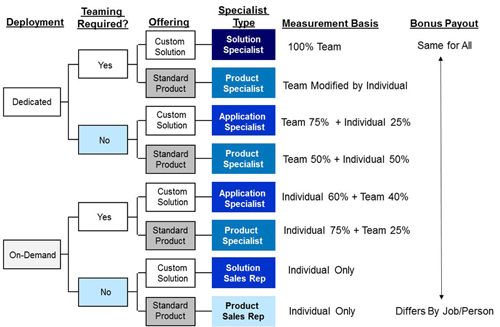How Should You Compensate Sales Specialists?
Simply Pay Double Credit?
The simple answer for handling specialists (and overlay positions in general) is to provide double credit – credit both the sales rep and the specialist equally for the sale. Providing double credit ensures that your sales reps will not avoid working collaboratively with specialists for sales crediting reasons. Double crediting supports team selling. Both the rep and the specialist receive full sales credit. Everyone is happy. Right? Of course, it’s not that simple. Unfortunately, we live in a complicated world. And simply paying double credit on everything not only doesn’t work from a teaming standpoint in all cases, but it also won’t work financially.
We recently worked with a client that was lamenting the proliferation of overlay roles in their sales organization. In the aftermath of celebrating a recent big win, sales finance confessed that over 160 people were compensated on the same deal. They were too embarrassed to share the resulting cost of sales tied to that specific deal (let’s just say it was high!). But the math was correct based on their crediting rules and the various layers of specialists. The company immediately embarked on a major initiative to evaluate the use of overlays and the design of their crediting rules to drive greater individual accountability and reign in sales costs.
Crediting Rules for Specialists
The proper method for setting crediting rules for specialists involves understanding their role in the sale. Some specialists should receive double credit on everything, for example, a solution specialist that designs a custom solution with the rep. However, a product specialist is often assigned a specific product quota. In this case they should only be credited for their assigned product sales in their assigned accounts or territory. Not surprisingly the answer lies again in careful job design. (Sales compensation and crediting design always follow job design.)
Types of Specialist Roles
There are many types of specialist roles. Here is a job decision tree you can use to determine the type of specialist role and the recommended compensation design.
 The first question asks how the specialist is deployed. Are they dedicated to a team or are they simply available when needed (“on-demand”)? A dedicated specialist represents an offering that is mission critical to the company’s growth objectives. This usually means the primary sales rep must leverage the specialist in order to achieve his or her sales target. An on-demand specialist represents a more opportunistic offering, perhaps a newer, less tested offering, or an offering resulting from a recent acquisition. Next, how much teaming is required? Some offerings require the involvement of several team members collaborating to pursue the sale, for example, the design of a custom solution that requires the teaming of a rep, a pre-sales engineer, and a solution specialist. Other offerings a rep might be able to sell on his or her own but could seek help from a specialist as needed. The final question is about the type of offering – custom or standard? Custom solutions usually are more complex and require more interaction with the customer than standardized products.
The first question asks how the specialist is deployed. Are they dedicated to a team or are they simply available when needed (“on-demand”)? A dedicated specialist represents an offering that is mission critical to the company’s growth objectives. This usually means the primary sales rep must leverage the specialist in order to achieve his or her sales target. An on-demand specialist represents a more opportunistic offering, perhaps a newer, less tested offering, or an offering resulting from a recent acquisition. Next, how much teaming is required? Some offerings require the involvement of several team members collaborating to pursue the sale, for example, the design of a custom solution that requires the teaming of a rep, a pre-sales engineer, and a solution specialist. Other offerings a rep might be able to sell on his or her own but could seek help from a specialist as needed. The final question is about the type of offering – custom or standard? Custom solutions usually are more complex and require more interaction with the customer than standardized products.
Specialist Compensation
As outlined above, the recommended compensation solution ranges from 100% teaming (and 100% double credit) to 100% individual, depending on the nature of the role. Notice that many roles may call for both a team and an individual measure. Crediting rules should be designed commensurate with the role. Specialists may receive credit on the entire deal as in the case of a solution specialist, or just on their assigned offering, as in the case of a solution sales rep.
It’s worth noting several other factors that may complicate the picture. Tracking and reporting systems may limit the ability to measure and credit at the individual or deal level for specialists. This leads to greater use of team measures and more people paid on more deals. Furthermore, sales reps may avoid collaborating with specialists or “landlord” their accounts, i.e. protecting them from intrusive specialists for fear of account disruption and/or product failure. Finally if the sales process or rules of engagement are not clear, teaming will not work well except in isolated cases. These are critical factors to the success of specialists but require solutions beyond sales compensation.
Infinitely Solvable
You might begin to think deploying sales specialists isn’t worth the trouble and headaches involved. The over-simplistic answer is “no overlays, and no double credit!” However, many industries, high tech in particular, require the use of various specialists. While it can be very challenging and entail hard work, deploying and even compensating specialists correctly can be done. And when done right the ROI can be substantial.

Get In Touch
Learn more about The Alexander Group’s sales compensation services or contact us to speak with our experts.
